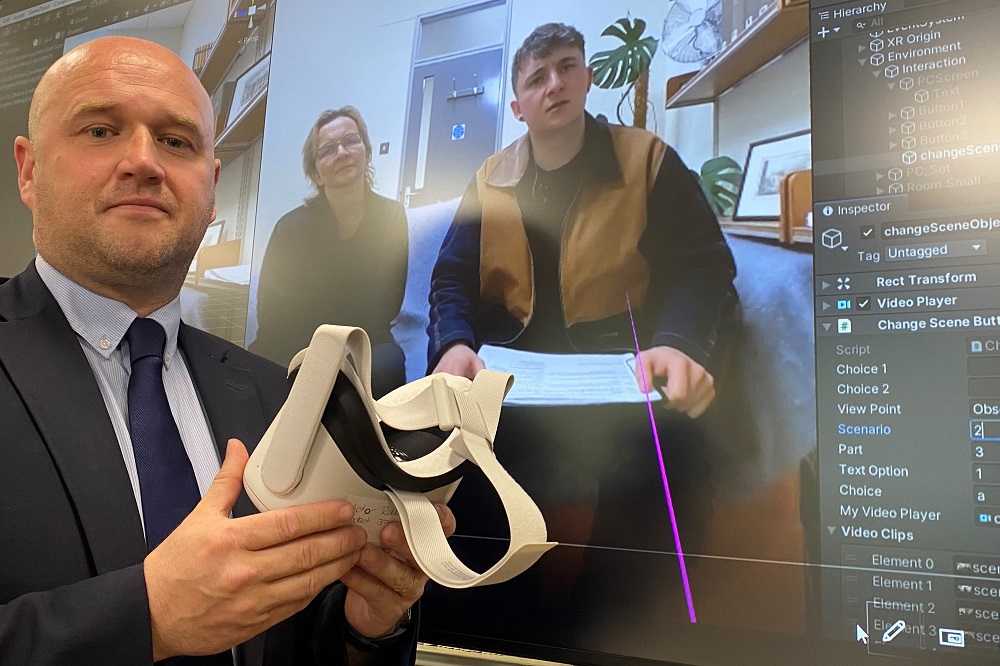Police test innovative VR experience to improve how they respond to victims of violence and abuse

Police officers and specialists in domestic abuse are using a new Virtual Reality training tool to improve how they respond to victims of violence and abuse
VR specialists Dr Helen Miles and Andra Jones from Aberystwyth University’s Department of Computer Science, have teamed up with Rebecca Zerk, Sarah Wydall and Elize Freeman from the Centre for Age, Gender and Social Justice to pioneer a prototype training tool thanks to Welsh Government-funded research.
“Many people will think of virtual reality as a form of entertainment”, said Helen Miles, Principal Investigator, “but the potential is so much greater: this technology offers a unique way to see the world through the eyes of someone else, allowing us to experience situations we may never experience in reality.”
The team worked with older victim-survivors, and partners from the Mid and West Wales Violence against Women, Domestic Abuse and Sexual Violence Network (VAWDASV) and Independent Domestic Violence Advisors (IDVAs) to co-develop the prototype virtual reality (VR) experience as a training tool to allow partners to see things from the perspective of an older woman making a disclosure of domestic violence and abuse.
Police response
Sarah Wydall, Principal Investigator on Dewis Choice, based at the Centre for Age Gender and Social Justice, said: “Through the VR headset, participants were able to take part in an immersive encounter depicting the initial police response at the home of an older victim-survivor of domestic violence and abuse.
“At various points during the scenario, the viewer was invited to make a choice about the direction of the help-seeking and safeguarding options presented.
“Their chosen response would lead to one of eight different pathways and possible outcomes”.
Rebecca Zerk the co-investigator added: “In this way, the VR experience demonstrated to participants how their behaviour and response to somebody making a disclosure of domestic violence and abuse, can influence the nature, direction and outcome at different stages in the help-seeking journey.”
Empathy
As part of the pilot study, thirteen practitioners including police officers and specialist domestic abuse leads evaluated the impact of this immersive VR experience to give their perspective on whether it increased empathy and sensitivity to victim-survivors, and identify development opportunities.
Rebecca Zerk said: “VR is known to have the potential to elicit deeper feelings of empathy, and the response from practitioners who evaluated the use of it as a training tool were positive. Evaluators commented on the level of realism and emotional investment in the scenario portrayed, and the beneficial impact of the VR approach as a pedagogic tool.”
One of the partners on the project was Detective Chief Inspector Richard Yelland from Dyfed Powys Police, who said: “Traditional police training has for many years been successful in providing frontline officers with a knowledge base required to respond to domestic abuse incidents.
“This traditional method fails in providing new recruits a real sense of dealing with a victim, and more experienced officers the knowledge to overcome officer norms whilst re-establishing victim empathy.
“The Virtual Reality training tool provided me with an experience I have not felt during any of my 21 years in policing. The device was simple to use and I felt completely immersed in the scenario.
“The ability to see through the eyes of a survivor really challenged my extensive experience in dealing with cases of domestic abuse.
“This technology is a must in the future of police training.”
Support our Nation today
For the price of a cup of coffee a month you can help us create an independent, not-for-profit, national news service for the people of Wales, by the people of Wales.





Has it got a setting for dealing with victims of police abuse?
Ha! But what about Womens Police stations? A good idea from Pakistan of all places.
I see the small womens station as later dealing with other abused who may be intimidated by a police station, but first things first. A woman police officer presents a softer image………………
A new method to try and teach police empathy? Those that have it don’t need teaching and those that don’t have it can’t be taught it
Those that have it are weaned out at the selection process stage.